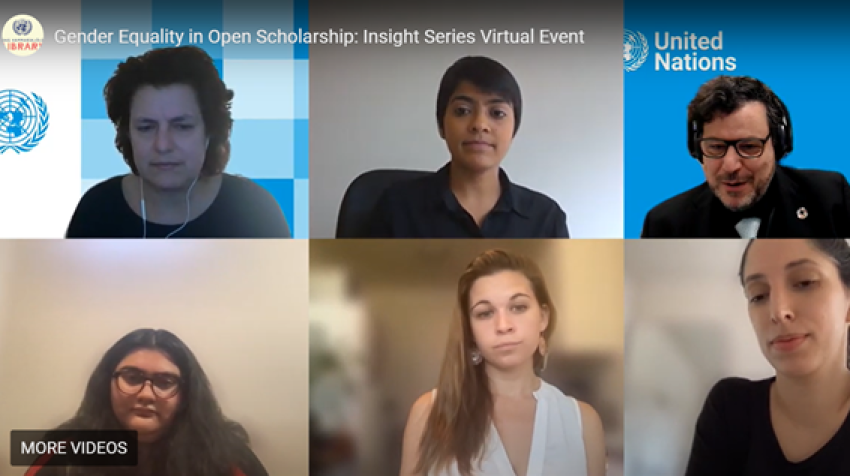Open Scholarship encompasses open access to scientific information, open data, open educational resources and all other forms of openness in the modern scholarly and research environment and has fundamentally changed the way knowledge is created and shared today. The Dag Hammarskjold Library hosted a webinar on Gender Equality in Open Scholarship. The event was held within the context of the March Goal of the month: (SDG) 5: Achieve gender equality and empower all women and girls.
Panelists included early career researchers and leaders in Open Scholarship from various academic institutions, who engaged participants with a thought-provoking dialogue on gender equality and access to research for all. They discussed their experiences and challenges as young women in their endeavours to stay on course as advocators of Open Scholarship.
The discussion highlighted one of the key themes that were discussed at the DHL-DESA 2nd Global Open Science Conference, which underlined the importance of ensuring that scientific research was accessible to all, more so, during a time when the world is faced with a global pandemic. In her presentation, Ms. Denisse Albornoz, a digital rights specialist remarked that as much as Gender equality is a discussion, it cannot be held in insolation:
“In order to comprehensively address gender inequality in science, it is essential that we address additional forms of oppression and marginalization in the academy (e. racism, homophobia, ableism, classism, weight stigma).”
The event was attended by over 100 participants from various institutions across the globe including members of the diplomatic missions, UN depository librarians, academia, and UN staff. Ms. Tracey Peterson, the Gender Focal Person in the Outreach Division moderated the event and the engaging 20 minutes Q&A session.
Panelists
- Ms. Denisse Albornoz: Digital rights researcher & practitioner
- Dr. Jaclyn Siegel: Postdoctoral research scholar at San Diego State University, Project Director for the Pride Body Project
- Ms. Kohinoor Darda: Postdoctoral researcher in cognitive neuroscience, Penn Center for Neuroaesthetics, University of Pennsylvania
- Ms. Kanishka Sikri: Writer & Theorist, PhD candidate at York University
Moderator: Ms. Tracey Petersen, United Nations Gender Focal Point: Department of Global Communications (Outreach Division)
Biography of Panelists
Denisse Albornoz
Denisse Albornoz (she/her) is a digital rights researcher and practitioner. Her work investigates emerging risks and inequalities in technology use from an intersectional feminist perspective, focusing on online harms that target women and youth. Having worked with the Centre for Internet and Society (India), Hiperderecho (Peru) and Tactical Tech (Germany), she specialises in participatory research and community education projects that work to integrate diverse epistemic communities and forms of knowledge into the design of community or policy interventions. She has also been a public advocate for knowledge equity through her involvement with the Open and Collaborative Science in Development Network, the Knowledge Equity Lab, and the OpenCon community. Her work in this area has contributed towards critically discussing the role of open science in addressing epistemic injustice and promoting more inclusive and feminist knowledge infrastructures.
Dr. Kohinoor Darda
Dr. Kohinoor Darda is a postdoctoral researcher in cognitive neuroscience at the University of Pennsylvania in Philadelphia, working at the Penn Center for Neuroaesthetics. She is broadly interested in the cognitive and brain mechanisms underlying our interactions in the social world, and our experiences with art. Specifically, she investigates the role of cultural and contextual factors in aesthetic experiences and social interactions. Kohinoor is an advocate for open and accessible science, and passionate about science communication and community engagement. As a trained Indian classical dancer, she likes to integrate her background in the performing arts and her interest in neuroscience in both her research and choreographic endeavors.
Jaclyn Siegel
Dr. Jaclyn Siegel (she/her) is a postdoctoral research scholar at San Diego State University. She presently serves as the project director for the Pride Body Project, an eating disorders prevention program for sexual minority men. Her scholarship focuses on the intersections of body image, gender, sexuality, and social attitudes. She recently served as the lead editor on a special issue of Psychology of Women Quarterly focusing on challenges and opportunities for integrating feminist psychology and open science.
Personal website: jaclynasiegel.com
Twitter: @jacasiegel
Kanishka Sikri
Kanishka Sikri (kanishkasikri.com) is a writer and theorist thinking about violability: the practice that marks certain lives, bodies, and worlds to the possibility of violence. She is currently a PhD candidate at York University speculating on the ways violence becomes synonymous with and inhabits the flesh. Looking at the discursive and epistemic, Kanishka asks how we may speak about violence, lay it bare, grieve and mourn its many insidious faces without replicating the notion that certain lives are violable and capable of being violated.

